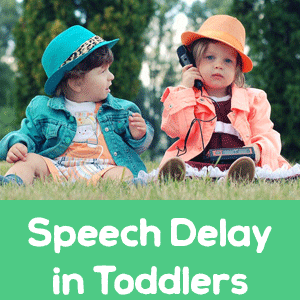Speech Delay in Toddlers: Causes and Tips
 Sometimes it may seem that your toddler is lagging behind in developmental skills compared to other children their age. While it is true delayed development can be concerning sometimes it really is a case of children learning at different speeds. Today we at Kinder Buddies Oakville Child Care go over when to be concerned and steps you can take to help your toddlers speech development.
Sometimes it may seem that your toddler is lagging behind in developmental skills compared to other children their age. While it is true delayed development can be concerning sometimes it really is a case of children learning at different speeds. Today we at Kinder Buddies Oakville Child Care go over when to be concerned and steps you can take to help your toddlers speech development.
What is “Average”?
Children can develop at different levels, there are some average milestones featured by the NIDCD:
- 7 Months to a 1 Year: Understands common words (cup/shoe), knows one or two words (Mom/Dad/Cat)
- 1 to 2 Years: Can combine two words (More cookie), Learns new words daily, Uses one or two word questions (Where cat?)
- 2 to 3 Years: Uses sentences with four or more words, can answer simple questions (Who/What/Where/Why)
- 4 to 5 Years: Can tell stories on topic, knows some letters and numbers, uses sentences with many details
If you have any concerns on your child’s speech development it is important to reach out for help early. The Halton Region has programs that will help you track your child’s development and help connect your family with any services that may be needed.
Causes for Delayed Speech
- Premature Babies: Preemies may be delayed in a few milestones they will usually catch up around age 2.
- Chronic Ear Infections: Learning to speak includes mimicking those who speak around them, if toddlers are having difficulty hearing it may take them longer to learn.
- Late Blooming: If your toddler is reaching or exceeding all other milestones they may just be busy learning other things.
Encouraging your Toddler to Talk
If after talking to your paediatrician you are still concerned about your toddlers speech growth we have some activities and tips that encourage speech:
- Avoid using gibberish: Speak to your child as you would speak to an adult, using none sense words can confuse them.
- Baby talk actually helps: Using a singsong voice or using different intonation has actually been proven to help children learn faster!
- Use meaning: Use longer sentences. Instead of just saying the subject (Dog) provide context that makes it easier to understand (That is a big dog!)
- Read books with your Child: Try and make story time interactive, allow your child to point at pictures and give them context. While they may not be speaking, understanding words is important as well!
- Give them time to respond: When you ask questions give them time to respond. Even if sometimes they speak in gibberish allow them the chance to respond and they will be encouraged to speak.
- Speak slowly: It is easier for children to understand when we speak slowly.
- Avoid background distractions: Background music or tv can confuse children as they learn better in person. Turn off distractions during play time to encourage speaking.
Kinder Buddies is a Quality First Daycare and Child Care facility in Oakville, Ontario. We take care of children from the age of 6 weeks to 5 1/2 providing nutritious meals and fun activities all day long.

 Previous Post
Previous Post Next Post
Next Post